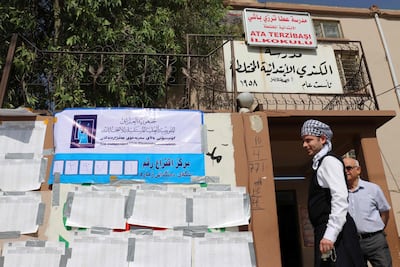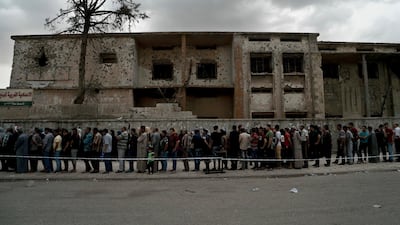Iraqis voted on Saturday in the country's first parliamentary elections since the toppling of ISIS, with the ballot conducted largely free of violence.
The outcome is considered vital to shoring up peace and rebuilding the war-battered nation after years of conflict.
Turnout in the election was 44.52 per cent with 92 per cent of the votes counted, the electoral commission said late on Saturday.
Prime Minister Haider Al Abadi, who is aiming to retain his job after declaring victory over ISIS in December, played up his track record, after voting in Baghdad.
"Iraq is strong and unified after defeating terror," he said. "The elections will determine Iraq's future."
Ahead of the vote, ISIS threatened to target the event and officials warned that ballot stations could be hit.
An unconfirmed shooting reportedly killed members of the security forces south of the ethnically diverse oil-rich northern city of Kirkuk, although there was no immediate claim of responsibility or any apparent link to the election.
But there were concerns about voter turnout, with many citizens saying they lacked confidence in the candidates to do what was needed to improve people's prospects.
There were also complaints that a curfew that barred cars and buses from the streets of major urban centres had made it difficult for some voters to reach their designated polling station.
___________
Read The National's live reporting on the election here
Iraq voters face security threats and uncertainty
___________
After a midday appeal from the office of Ayatollah Ali Al Sistani, Iraq's top Shiite cleric, urging citizens to vote, Mr Al Abadi also lifted the traffic curfew.
A spokesman for Mr Al Sistani in the religious city of Karbala said participation was necessary "to prevent the arrival of a corrupt parliament".
In a separate development, the governor of Kirkuk declared a curfew on Saturday and ordered a manual recount of votes there, saying an electronic counting system had produced an “illogical” result.
Rakan Al Jubouri said the curfew would run from midnight until 6am to prevent any ethnic or sectarian tension between its Kurdish, Arab and ethnic Turkmen communities.
Mr Al Abadi came to power in September 2014 after then premier Nouri Al Maliki resigned in disgrace because of the rise of ISIS months earlier.
The incumbent is favoured among analysts to remain prime minister but Mr Al Maliki, who held the job for eight years, was attempting to usurp him.
Also in the running was Hadi Al Ameri, a longtime Shiite militia leader with a controversial past and particularly close ties to Iran. Results are expected on Monday, electoral officials said.
Iraq's three main ethnic and religious groups – the majority Shiite Arabs and minority Sunni Arabs and Kurds – have been at odds for decades. Sectarian divisions remain deep despite all three groups joining forces in 2014 to fight ISIS, which had seized large areas of northern and western Iraq and at one point seemed poised to move on Baghdad.
Mr Al Sistani, who in 2014 criticised Mr Al Maliki for security failures that helped ISIS to storm the country, has repeatedly encouraged Iraqis to vote into power a new political class to combat corruption, in remarks considered to be a renewed attack on the former prime minister.
______________
Read more:
Iraq elections 2018: country readies for first polls since end of ISIS war
Iraq vice president says elections alone will not solve the country’s problems
Comment: We have not yet seen the full impact of ISIS sleeper cells coming back to life
Displaced Iraqis return to destruction and death ahead of elections
______________
The polls came at a time when tensions are surging between Iran and the United States after President Donald Trump pulled out of a 2015 nuclear deal with Tehran. His withdrawal has raised fears of a renewed power struggle in Iraq between Tehran and Washington and the potential for a new outbreak of conflict in the Middle East.
Saudi Arabia, which in 2016 reopened its embassy in Baghdad and has seen ties with Iraq improve since, also has a lot at stake. Mr Al Abadi has maintained a middle ground approach to Iraq's foreign policy. However if Mr Ameri’s Fateh bloc or Mr Al Maliki's State of Law coalition increase their number of seats in parliament, Baghdad could swing closer to Tehran.
Roughly 24.5 million Iraqi voters were eligible to cast ballots in an election in which the dominant Shiite powerbrokers were split, the Kurds in disarray and the Sunnis sidelined. Overall, just under 7,000 candidates were standing, seeking a place in the 329-seat parliament in Baghdad.

More than 15 blood-sodden years since the US-led ousting of Saddam Hussein, disillusionment is widespread and politics is dominated by old faces from an elite seen as mired in corruption and sectarianism.
No attacks on polling stations were reported. In comparison, Iraq's elections in 2010 were marred by widespread violence and insecurity, with dozens of people killed on polling day by roadside bombs, rocket and mortar attacks in Baghdad, Tikrit, Baquba, Samarra, Mosul and Fallujah.
On Saturday, at a polling station in the majority Shiite Baghdad district of Karrada, 74-year-old Sami Wadi appealed for change "to save the country".
"I call on all Iraqis to participate in the elections to prevent those who have controlled the nation since 2003 from staying in power," the retiree said.
In Mosul, Iraq's second city and the former ISIS bastion that now lies in ruins after the nine-month battle to oust the group, residents spoke of struggling to put their lives back together.
"I am voting for security and the economy to stabilise and for a better future," said 26-year-old labourer Ali Fahmi.
But others saw little point in backing familiar faces who many say have failed to make good on campaign promises. "Each election is the same - nothing ever changes," said Mounes Fauzi, a 27-year-old barber from Baghdad who did not bother to vote.
Ranj Alaaldin, a visiting fellow at the Brookings Institution suggested that disillusionment was a likely factor in Saturday’s turnout.
"There isn't anything particularly refreshing," he told The National. "The usual players that have dominated the political scene are likely to continue their corrupted, dysfunctional rule of the country. That isn't lost on Iraqis and they have clearly sent a strong message to the political class."











